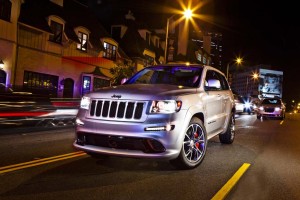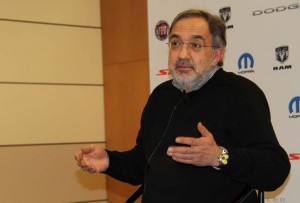
While the Jeep Grand Cherokee is set to get a new diesel, Chrysler won't be using the high-mileage technology in its small cars.
Chrysler will begin building the diesel version of the Jeep Grand Cherokee at the Jefferson North assembly plant in Detroit early in 2013. But Fiat/Chrysler chief executive officer Sergio Marchionne said he doesn’t expect diesel engines to move from large trucks and SUVs into smaller passenger cars in the U.S.
The necessary emission controls make the engines too expensive, Marchionne said during an appearance at the Automotive News World Congress. The Canadian-born executive also said Chrysler won’t begin preparing the Jefferson North plant to build a new Maserati SUV — using a Ferrari engine — until 2013 and dismissed speculation Fiat could be lining up to make a bid for Opel.
He also said the industry has a social responsibility to improve fuel economy. “The fuel efficiency challenge is one of the biggest issues facing the industry, and not just because of daunting government regulations. As an industry, we need to look beyond the narrow interests of our industry and embrace ecological responsibility because we owe it to future generations,” he said.
And unlike some skeptics, Marchionne said such improvements as meeting the 54 mpg Corporate Average Fuel Economy standard set for 2025 are do-able.
“I believe in our industry’s ability to find solutions. Even with traditional combustion engines, we have only skimmed the surface of the ability to squeeze out higher fuel efficiency levels, allowing us to extract much more power out of smaller displacements,” Marchionne added.
Marchionne added Chrysler has no intention of resting on its laurels after a successful 2011 in which it succeed in selling more than 2 million vehicles and gaining market share. “This is a story of revitalization in a company that was regarded as irrelevant, set in a city that has been disparaged as a failure.
“It is just one example of how impossible feats of recovery can be achieved if we work together in good faith, realizing that we have a stake in each other’s success,” he said.
Industry observers initially reacted with skepticism when Marchionne and his team announced an aggressive turnaround plan in late 2009, less than six months after the U.S. maker emerged from bankruptcy. The industry buzz has been much more positive of late, especially after Chrysler scored double-digit sales gains – and presented a much-improved bottom line – in 2011.
That suggests to many that the trans-Atlantic alliance is beginning to work – though the big test is to come, with the launch of the new Dodge Dart at this week’s Detroit Auto Show a first step. It is the first vehicle to share a new, jointly developed global “architecture” that will serve as the foundation for a number of future Chrysler and Fiat products.
“Fiat and Chrysler come from two different pasts, but they have something very strong in common,” said Marchionne. “Both have been to hell and back.”
“The current situation doesn’t favor a business like ours – an industry that is extremely capital intensive, requires thorough medium- and long-term planning, and is highly sensitive to economic downturns,” the executive said, noting, “Today there are two significant threats fuelling fears on either side of the Atlantic: the specter of a faltering recovery in North America and the sovereign debt situation in Europe.”
Marchionne added the current uncertainty is a by-product of the improper, or at best incomplete, execution of two large experiments.
“The first, clearly driven by the United States, had as a clear objective the liberalization and deregulation of financial markets,” he said.
“The second, concocted in Europe, proposed the Single Market and Single Currency as the solution to the political instability that had characterized Europe for hundreds of years,” Marchionne added. “The first experiment brought us close to Armageddon. The second has the potential to finish the job.”
Marchionne, however, told reporters after his speech that he was a “realist” and believed European governments would succeed in finding a solution to the euro issue. The collapse of the euro would lead to the reinstatement of local currencies, which could favor countries such as Italy and Spain. However, countries such as German could face difficulties. A new Deutsche make could make life difficult for German industry and exports since it would quickly appreciate against other currencies.

